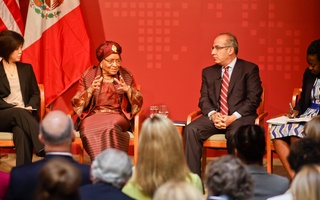In June 2009, Liberia’s Truth and Reconciliation Commission—intended to curb government corruption—recommended that Sirleaf be banned from holding public office for 30 years because she financially supported the corrupt president Charles Taylor in the first days of the First Liberian War.
In July 2009, Sirleaf apologized for her support of Taylor.
“When the true nature of Mr. Taylor’s intentions became known, there was no more impassioned critic or strong opponent to him in a democratic process,” she said in an Independence Day speech.
In late 2010, Sirleaf dissolved her entire cabinet and reassembled a new administration in the midst of allegations of corruption in the Liberian government.
A SIGNIFICANT SPEECH
The University’s selection of Sirleaf to deliver this year’s commencement address—which was announced March 10—has been well-received among faculty.
“As the first female elected head of state on the African continent, President Sirleaf has worked tirelessly to improve economic and political conditions in Liberia, and to improve the lives of all people in her country,” Harvard Kennedy School Dean David T. Ellwood said in a statement.
“We at the Kennedy School are very proud of her many accomplishments, and continue to support her efforts to bring about positive change in Liberia.”
Kennedy School Lecturer John W. Thomas—who met Sirleaf when she was a student at the Kennedy School and has interacted with in the years since—said he thinks Sirleaf’s selection speaks to her outstanding personal qualities.
“Here is a woman who has stepped in to try to reconstruct a truly failed state when she could be working at an investment bank,” Thomas said, referring to Sirleaf’s work at the World Bank and Citibank.
“We certainly have [had] commencement speakers with less courage and accomplishments than she has,” he said.
Thomas added that he thinks the selection of Sirleaf as commencement speaker reflects the rising prospects of Africa.
“For the first time, people are beginning to say hopeful things about Africa,” he said.
“I think she represents the kind of leadership that’s going to be necessary to try to make that happen.”
Gonzalez-Pose echoed Thomas’s sentiment.
Read more in News
Dining Halls Closed for Spring BreakRecommended Articles
-
Liberian President Ellen Johnson Sirleaf Named 2011 Commencement SpeakerLiberian President Ellen Johnson Sirleaf, a Harvard Kennedy School alum, will be the 2011 Commencement speaker, the University announced today.
-
 Liberian President Ellen Johnson Sirleaf Calls on Harvard Graduates To Be Hopeful, Resilient
Liberian President Ellen Johnson Sirleaf Calls on Harvard Graduates To Be Hopeful, Resilient -
Alums Vie To Lead LiberiaTwo Harvard graduates who maintain strong ties to the University are competing for the presidency of Liberia.
-
 Ellen Johnson Sirleaf, Kennedy School Alum, Wins Nobel Peace Prize
Ellen Johnson Sirleaf, Kennedy School Alum, Wins Nobel Peace Prize -
Alumni Compete in Liberian ElectionBoth graduates, Ellen Johnson Sirleaf and Winston A. Tubman, are widely considered to be the frontrunners.
-
 Kennedy School Transitions into Public Phase of $500 Million Campaign
Kennedy School Transitions into Public Phase of $500 Million Campaign













